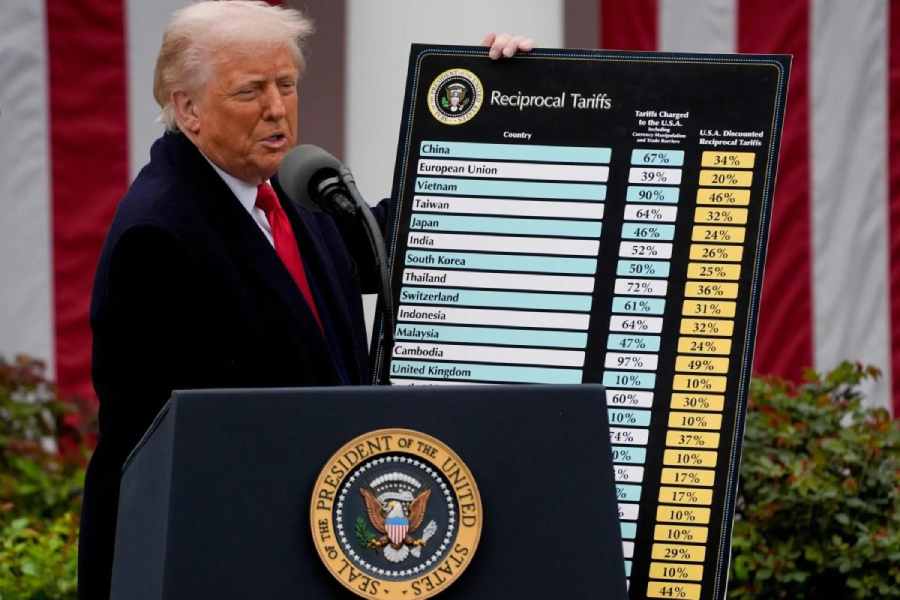Donald Trump is weaponising tariffs to achieve all sorts of ends: to undermine the BRICS bloc of countries; to enforce the unilateral economic sanctions imposed by the Western powers on Russia; to browbeat Brazil into not prosecuting its former president, Jair Bolsonaro, and so on. But the main thrust of his tariff policy is to enlarge output in the United States of America by raising the demand for its home-produced goods at the expense of imported goods. Since such tariffs are not accompanied per se by any increase in government spending, they merely amount to snatching markets away from other countries for American producers — that is to pursue a ‘beggar-thy-neighbour’ policy whereby American output and employment would increase by reducing output and employment in other countries.
There is, however, an additional effect of such tariffs. In the process of diverting markets for its own producers, a country also destroys markets. Tariffs raise domestic prices relative to the money wage rate (otherwise home-produced goods would never be able to compete with imports); but this also means a reduction in real wages and, hence, in aggregate demand. If the total world demand happens to be 100 to start with, and one country has 30 of it while the other has 70, then the attempt by the first to raise its demand and output to 40 by using tariffs means not that the other country is left with 60; it simultaneously means a shrinking of total world demand to, say, 90. Tariffs do not just mean snatching a larger share of a given world demand; they also bring about a reduction in world demand.
As a response to a crisis (and its associated unemployment), tariffs in such a setting are particularly inapposite, for, in alleviating the crisis for one country, they accentuate the crisis for all countries taken together. And if other countries retaliate against the first by imposing countervailing tariffs, then, while it may snatch back some of the market lost to the first because of its initial tariff, it further accentuates the crisis for all.
It is tempting to attribute the pursuit of such an inapposite strategy in the midst of a crisis to the silliness or the bloody-mindedness of a Trump; but that argument cannot stand scrutiny. If countries could increase their fiscal deficits, then the overall world demand could increase and no matter whether tariffs are imposed by each country, output and employment could increase everywhere. In fact, during the Great Depression of the 1930s, a group of German trade unionists, and also the English economist, John Maynard Keynes, had separately suggested that the world’s major economies should undertake a coordinated fiscal stimulus to boost world aggregate demand and overcome the Depression. There had been no takers for the proposal then (only the fascist countries, using fiscal deficits for boosting military expenditure, had overcome the Depression). Today, with the hegemony of globalised finance capital firmly established, which, like all finance capital, dislikes fiscal deficits, there is no question of an expansion in world aggregate demand.
It is precisely in a situation where the world market cannot increase through either separate or coordinated government intervention that struggle erupts over grabbing a larger chunk of this given market. The pursuit of ‘beggar-thy-neighbour’ policies through the imposition of tariffs then becomes the obvious remaining instrument for increasing domestic output and employment. It is not the silliness or bloody-mindedness of a Trump that is responsible for the tariff war but the hegemony of globalised finance capital, which is an essential feature of neoliberal capitalism.
The fact that the use of this obvious remaining instrument by each country for raising domestic output and employment ends up worsening output and employment in the world as a whole only underscores the ‘irrationality’ of neoliberal capitalism, which, in turn, is rooted in the ‘irrationality’ of capitalism.
Keynes had not reckoned with this ‘irrationality’. Writing in the shadow of the Bolshevik Revolution and acutely aware of the flaws of the capitalist system, which of course he had to be in the midst of the Great Depression, he was keen to rectify these flaws in order to preserve the system. Towards this end, he advocated what came to be known as State intervention in ‘demand management’ in the confident belief that the objections of finance to the use of fiscal deficits for this purpose, since they were based on an inadequate understanding of economic theory, would disappear as the correct understanding spread.
But the opposite happened; far from Keynesian ideas that advocated the use of fiscal deficits for overcoming the involuntary unemployment that plagued capitalism gaining acceptance over time, Keynesianism itself got marginalised. Legislation limiting the ratio of the fiscal deficit to gross domestic product was enacted almost everywhere which made State intervention to boost activity virtually impossible. Trump’s tariff offensive is a response to this cul-de-sac and an assertion that the system’s ‘irrationality’ cannot be overcome.
Why, it may be asked, does capital in general, and finance in particular, object to fiscal intervention by the State? Because such intervention delegitimises the system, it raises the question: if the State is necessary for rectifying the aggregate consequences of capitalists’ decisions, then why do we need capitalists at all? Keynes’s fear, that unless the flaws of the system are overcome they would be transcended, arises at an even earlier stage: if the flaws of the system are overcome through State intervention, then it will be transcended, with the demand for the State to run the economy gathering momentum. This fear makes the system’s defenders embrace all its ‘irrationality’.
Prabhat Patnaik is Professor Emeritus, Centre for Economic Studies, Jawaharlal Nehru University, New Delhi











